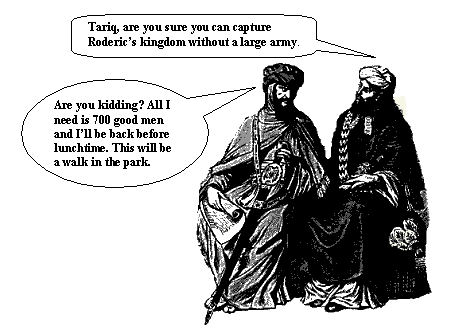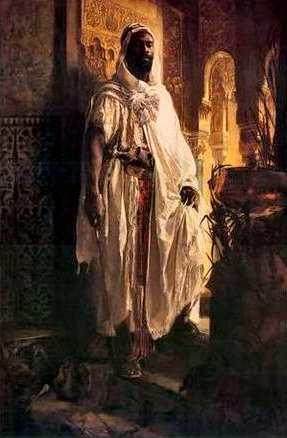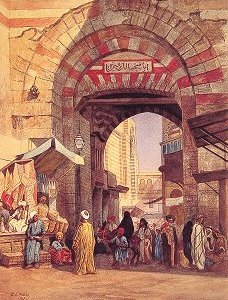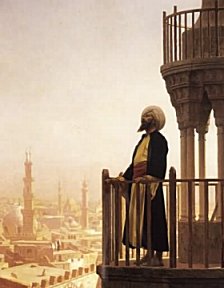The Moors
Events leading up to the Muslim conquest of Spain.
After the sudden death of the Visigothic King Witiza (701-711), a rebellious baron and powerful chieftain called Roderic (also known as
Rodrigo), with support from within the palace, seized the throne and proclaimed himself king. The church leaders reluctantly gave their
blessing to the coronation, realizing that to do otherwise was to incite further fragmentation of a country already in great turmoil.
Roderic's first task was to travel north to suppress the rebel Basques. He knew that if they broke away from his control, other regions would
follow their example and his kingdom would soon collapse. In the meantime, the sons of the late King Wittiza appealed to the Muslims of North
Africa for assistance against Roderic. The Arab commander Musa however, had other plans.
(The plot thickens.)

Moorish Princes - Braun and Schneider - c.1861-1880
The invasion.
In the year 710, a scouting party of 700 Muslim Berbers led by the Berber leader Tariq ibn Ziyad, entered southern Spain and met with little
resistance as they established control over the coastline. 20,000 or so non-Muslims within Spain, who welcomed the newcomers as allies rather
than conquerors, aided them willingly.
|
To put things in a clearer racial perspective, W. E. B Dubois in his work, "The World and
Africa," wrote on this subject. "The Arabs brought the new religion of Mohammed into North Africa. During the seventh
century, they (the Arabs) did not migrate in great numbers. Spain was conquered not by Arabs, but by armies of Berbers
and Negroids led by Arabs."
The truth is that the conquest of the Iberian Peninsula, Spain and Portugal, was an African not an Arab conquest. The
conquest of Spain and Portugal in the eighth century, and later the greater part of western Europe, was orchestrated by
the Arabs who conquered North Africa; but the actual conquest was carried out by African adherents of Islam.
Ref
|
Apart from Roderic's enemies, this number included many persecuted Jews and peasants, who hated all Visigoths. The Visigoths were so
busy fighting amongst themselves, they were slow to realize what was really going on. When word of the invasion was finally sent to Roderic,
he quickly returned to the south with a small band of men. They were easily overwhelmed and defeated in an ambush and Roderic was killed by
Tariq's men on 19th July 711 (around lunchtime).
800 years of Muslim rule
 |
|
The Moorish Chief - Eduard Charlemont (1878)
Philadelphia Museum of Art
|
This initial incursion was followed in 712 by a mainly Arab force of 18,000. The non-Arab portion of this number included more
Berbers, Egyptians, Yemenis, Syrians and Persians. After many bloody revolts and power struggles, the Arabs took control in 788. The Berbers,
despite their assistance in the successful reconnaissance mission, were soon reminded of their subordinate status in the Arab Empire and were
virtually treated as second class citizens.
For the next 300 years or so, despite periods of instability, Andalucia flourished as a center of learning, culture and trade under Arab
rule. In the year 1090, a dynasty of Berbers called the Almoravids seized power from the Arabs. In 1147 an opposing dynasty of Berbers called
the Almohads muscled their way into power.
In 1237, the Arab controlled Nasrid Sultanate overthrew the decaying Almohad Empire and began building the Alhambra in Granada. By this time,
all that was left of 'Moorish' held Spain was the southwest corner of the Peninsular. The Christians in the meantime continued their push
southward until they finally moved in on Granada in 1492. The "capitulation" of the Catholic Kings, which took the form of the "Treaty of
Granada" and outlined 69 articles of religious tolerance, was enough to woo the Moslems into surrendering peacefully. For a few short years
there was a tense calm in the province but the inquisitors were never happy with the deal. The Church advisors, using religious
justifications, convinced Ferdinand and Isabella to break the treaty and force the Moslems to become Christians or get the hell out of
Spain.
To the Christians, Moor simply meant Muslim barbarian. They didn't care where these 'Moors' came from. Their only interest was to evict every
last one of them from Spain. The term 'Moorish' can really only be applied with any accuracy to the unique architecture in the region.
Because of the dazzling variety of races unfairly lumped together under the blanket term 'Moors', it is far safer to use the word Islamic
when talking about influences, and Muslim when talking about the people.
The Moorish Bazaar
Edwin Lord Weeks (1873)
|
A Call To Prayer
Jean Leon Gerome (1879)
|
|






